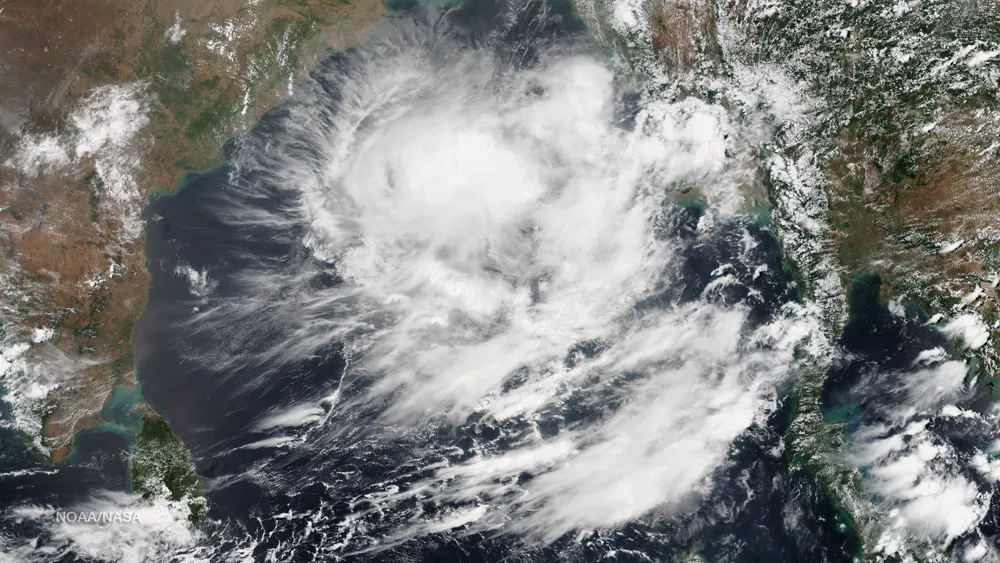
Chennai Weather Update: Cyclone Fengal has caused heavy rains, waterlogging, and traffic disruptions across Tamil Nadu, including Chennai. With the India Meteorological Department (IMD) issuing orange and red alerts for several districts, residents are bracing for more disruptions as the storm approaches landfall.
Cyclone Fengal: A Closer Look
Cyclone Fengal, currently classified as a deep depression, has disrupted normalcy across Tamil Nadu. Located over the southwest Bay of Bengal, it is expected to pass between Karaikal and Mahabalipuram. This system is responsible for widespread rainfall, with heavy showers in specific areas.
Regions Under Alert
- Orange Alert in Chennai: Persistent rains and waterlogging have disrupted urban life.
- Red Alerts Issued: Chengalpattu, Villupuram, and Cuddalore are bracing for heavy downpours and potential flash floods.
IMD’s Weather Predictions
The IMD has predicted the following rainfall patterns over the next few days:
- Moderate Rainfall: Widespread across most parts of Tamil Nadu.
- Heavy Rainfall: Concentrated in Delta districts, Villupuram, Chengalpattu, and Cuddalore.
Impact on Daily Life
Traffic and Waterlogging
Heavy rains have caused waterlogging in low-lying areas of Chennai, leading to:
- Traffic Disruptions: Major arterial roads have slowed down due to water accumulation.
- Public Transport Delays: Buses and local trains are running behind schedule.
Power and Utility Services
Reports indicate:
- Localized Power Outages: Preventive measures have cut electricity in some flood-prone areas.
- Health Concerns: Stagnant water may lead to the spread of diseases.
Chennai Weekly Weather Forecast
28 November to 4 December
- 28–30 November: Heavy to moderate rainfall, temperatures ranging from 23°C to 28°C.
- 1 December: Reduced rainfall, partly cloudy skies with temperatures between 24°C and 28°C.
- 2–4 December: Intermittent showers and potential thunderstorms; temperatures peaking at 30°C.
Preparedness and Safety Tips for Cyclone Fengal
As Tamil Nadu braces for continued rain, here are some critical safety tips:
For Residents
- Avoid Flooded Areas: Stay indoors and avoid unnecessary travel.
- Emergency Supplies: Stock up on food, drinking water, and essential medicines.
- Electrical Safety: Disconnect electrical appliances in waterlogged zones.
For Commuters
- Check Weather Updates: Plan travel around IMD forecasts.
- Use Public Transport: Avoid driving in flooded conditions.
- Emergency Numbers: Keep local disaster management contact details handy.
For Businesses
- Remote Work: Encourage employees to work from home.
- Flood Protection: Use sandbags or barriers to shield premises.
How Cyclone Fengal Compares to Past Cyclones
Cyclone Fengal, although a cyclonic storm, is only Tamil Nadu’s third such storm in 2020 and remains moderate in impact, considering other cyclonic storms in the past such as Nivar or Gaja. The cyclone is expected to remain weak, causing minimal wind damage but significant rainfall, IMD said.
FAQs
What is Cyclone Fengal’s current status?
Cyclone Fengal is currently a deep depression and is expected to make landfall as a weak cyclone near Karaikal and Mamallapuram.
Which areas are most affected by Cyclone Fengal?
Chennai, Chengalpattu, Villupuram, and Cuddalore are the worst hit, experiencing heavy rainfall and waterlogging.
How long will the rains continue in Tamil Nadu?
Rainfall is likely to persist over the next 3–4 days, tapering off after December 4.
What safety precautions should residents take?
Avoid flooded areas, ensure emergency supplies, and follow IMD alerts.
Will Cyclone Fengal cause wind damage?
Wind damage is expected to be minimal as Fengal is likely to remain a weak cyclone.
How does Cyclone Fengal compare to earlier cyclones?
While its rainfall impact is significant, Fengal is weaker than cyclones like Nivar and Gaja, with limited wind speeds and damage potential.
Conclusion
Cyclone Fengal has brought Tamil Nadu under nature’s grip, reminding us of the importance of preparedness and resilience. With weather alerts in place and continued rainfall expected, the state is rallying to minimize disruptions. Residents are encouraged to stay updated with IMD forecasts and prioritize safety during this period of intense weather activity.